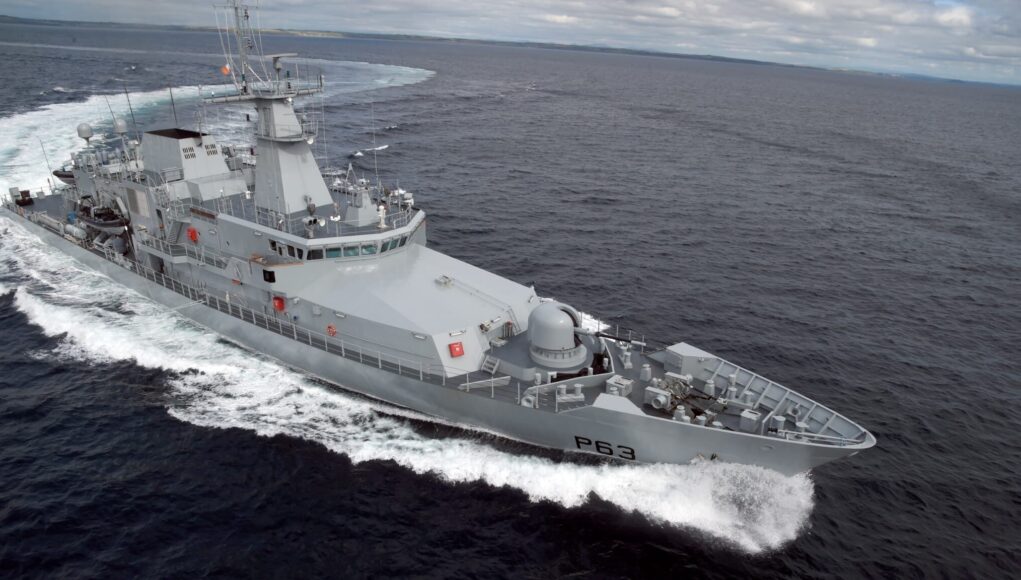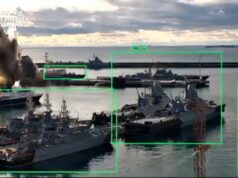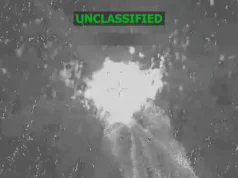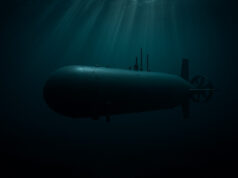A recent Irish parliamentary report has illuminated the ongoing challenges facing Ireland’s Naval Service, revealing that it is operating at only 66% of its agreed-upon strength.
The report, cited in TheJournal.ie, highlights a concerning downward trend in personnel numbers since 2016, presenting serious implications for national security and maritime operations.
According to the report, the established strength of the Naval Service is 1,094 personnel. However, as of March 2024, the service was operating with just 772 members. This shortfall represents a significant decline from 2016 when the Naval Service was almost at full strength, with 1,090 personnel.
As stated in the report: “Successive years of net personnel losses increases the pressure on available personnel, impacting on sea/shore rotation times, causing further retention difficulties”
The report identifies a key problem in recruitment and retention, noting that between 2012 and 2023, the Naval Service inducted 935 new personnel but lost 1,180 through discharges, resulting in a net loss of 243 naval personnel.
The scale of these discharges has not been fully explained, with the report calling for more data on whether they were voluntary or not. Furthermore, it highlights the impact on operations, stating that “the high volume of turnover in staff may suggest staff with less experience are being promoted into senior roles more quickly to ensure gaps at senior grades are addressed as soon as possible”
This personnel issue has had a direct impact on operational capacity, with patrol days sharply declining. Ireland’s fleet of eight ships could theoretically complete 1,600 patrol days a year, but only 520 patrol days were achieved in 2023. In addition to personnel challenges, the Naval Service’s funding levels remain a significant concern. The report estimates that €35 million more per year is required to bring the service back to full strength.
The report concludes that Ireland’s declining naval strength “aligns somewhat with decreased patrol days” and warns that without a strategic response, the ability of the service to meet its obligations will be further diminished.














Not good, Ireland is totally failing to protect its own economic arena of responsibility.
It needs to chuck some wedge at the situation quick smart.
Serious implications for national security…ability to meet its obligations…
With effectively no navy and air force, and a tiny army, I wonder what the obligations are and how serious the national security issue is.
AA
We all know they are parasites on the British tax payer when it comes to defence. When they come begging for us to protect their airspace, coastal waters and undersea cables. I’d tell them to bugger off to Brussels and ask them. If the fenians persist in sheltering under our protective umbrella. I’d insist they re-joined the UK of GB along with accepting our flag and monarch as head of state.
Ireland is a neutral country, it’s only obligations are what it chooses them to be.
Fine as long as the Irish Republic doesn’t expect any help if it all goes wrong.
It does have some under international treaty, but they are more around ensuring the correct management of fisheries and safety at sea including search and rescue as well as some policing requirements. It’s also got some defence related obligations around mutual defence of EU nations, the mutual defence clause, as well as the solidarity clause but that’s very weak and does not interfere with its neutrality.
But in reality Even the NATO treaty is a bit weak and wobbly With 2% being a pledge, which has no real teeth and even the article 5 response being whatever a nation decides is appropriate..which could be a slightly strongly worded letter if they were feeling the wobbles or is a nation run by Victor Orban.
Just a question, can Ireland recruit from the UK and Northern Ireland population as I served with many Irish lads in the RN? Maybe they should employ Capita to solve their recruitment problem? 😜
Ireland can recruit from the U.K. and the rest of the EU, as far as I know there isn’t a huge number but there are some.
They also recruit from the US and other anglosphere countries. But who in their right minds would choose to serve in a third or fourth rate armed force given the options?
Part of the selection process should be having their bumps felt.
That is the kind of comment that does little to foster positive relationships. Best to keep the gob sealed tight. Keep your poison internalised.
Positive relationships. Where were you in the 70’s and 80’s?
I served with a lad from Moss Side, Manchester in the early 80’s. He became a close friend. But, as you stated, it was a rare thing.
Having the Navy based in one of the major areas of multinationals isn’t helping given the salaries that can be offered, along with the disparity in areas like the engineering branch compared to the private sector. There are changes and improvements underway currently but even that has problems.
If you don’t have something like pay parity people will be driven to vote with their feet by their wallets.
That is entirely rational behaviour.
Ireland prides itself on being a high wage country…with high GDP per head of population…
At the same time it pretends a grown up defence budget isn’t needed.
Public pay is governed by national wage agreements, they are never going to be matching private sector or semi state wages.
With only a 1000 or so personally involved it doesn’t seem to me that raising pay would be that expensive as a solution to being able to deploy the fleet. The ships cost, even if idling in port.
AA
Course its the expensive part, their pay grades are part of national agreements, so if say a NS specialist got a 10% increase, every Public Servant/Union of the equivalent grade is going to demand the same or strike, made more complicated as the DF are still outside most of the public sector talks/agreements system.
One out all out, it sounds as militant as the UK is getting Mark…
For the majority of the system its actually fine and works, far better than before such agreements came in and you had a hundred and one unique deals per each section of the PS (which still meant if one got it the others would look for it). In terms of the pay agreements its more that the DF have never been at the table and the rest of the PS/Public don’t care.
It’s crazy Mark, so easily and affordably sorted with so few personnel to pay for too..
The problem with a socalist type system is you have to give Peter the same money as Paul, even though they do different jobs….
It simply gives you a poorly performing public sector.
How can Ireland just stand back and not protect its waters, smuggling, illegal fishing etc…
Ah well…
Same could be asked about the RFA in the U.K., few people, more than big enough defence budget and needed for the global RN operations…
True, it’s curious how they are simply letting the RFA fail, to be privatised, or perhaps absorbed into the RN, who knows….
Hell given the relatively small numbers the same question could be asked for why the USN is short people, the RN, RNZN, RCN etc. All have manpower issues that have been building up for years.
To be fair, NZ has all but given up on defence, they are happy to let the Australian tax payer cover them….
You could add other European navies/militaries to the list. The point is it’s not actually a unique problem to Ireland.
That’s true, I suppose the thing that highlights Irelands plight, is the fact like the UK, it’s an island nation with a huge coastal area to patrol and to protect and secure.
Sending a clear message that the the Irish government simply can’t be arsed to protect it, is a green light to any potential criminal or terrorist group to set up shop.
It’s a sad state of affairs, if I was an Irish national, I would be legitimately bloody angry about it.
Defence matters isn’t close to a priority for the Irish electorate.
And have no jets like Ireland 😟
The UK is not militant..ask the 500,000 NHS nurses..so lacking in militancy that they voted against a below inflation pay rise, but then did not vote for industrial action and got the pay rise they did not agree with anyway.
I’m glad they didn’t Jonathan, considering the general state of the NHS…
I’m Actually quite shocked at the number of people who are taking out private health care these days.
I had lunch with a few old colleagues the other day, turned out I was the only one that didn’t have a Bupa, or equivalent health plan!
It seems many of their mutual friends do too..
We’ve discussed this many times, but we need to decide as a country what the NHS can and can’t do (have a national NHS database to stop huge hospital to hospital duplication and waste), decide if supplemental private health insurance should be required, etc, etc….
Hi John I’ve given you a lovely response on health system reforms ( it’s a system not a service, as the whole concept of the NHS as a single service is a national lie..it’s a System of around 40-50 thousand different organisations, most of which are private businesses). But it’s been spam filtered so look out for it it’s a good five point read.
Morning Jonathan,
An excellent and thoughtful response it is too, I read it in my emails this morning.
( I would copy and paste it here, but it will also dissappear for GCHQ vetting)
Unfortunately the last government was simply bloody incompetent and this one will never step out of the TUC’s long shadow.
Any suggestion of any aspect of private care or reform within the NHS, and the Unions will turn onto a torch and pitchfork carrying baying mob!!
To be honest John it’s less the unions will turn all pitchforks and more the public will.
You have to remember healthcare is essentially revolutionary all the time, what we did last week is not what we do this week and new research will change our reality again in a weeks time. We toss out and change working practices constantly..it’s one of the reasons healthcare professionals have to re validate every 3 years..we have to literally provide an evidence portfolio of how we have improved and changed our practice to keep up. That means you professional unions are essentially change managers themselves..if you take the RCN it’s as much an educational institution as a union and it’s fundamental goal is the development of nursing, the strikes you have seen with healthcare professionals were more an act of desperation than anything else..so the royal colleges will generally accept any change that evidence shows will make an improvement.
The population thought is profoundly conservative in regards to healthcare and almost always is resistant to any changes, especially the idea of any form of personal responsibility in regard to healthcare and social care. Any government knows that if it tries to make individuals more accountable for their own healthcare or social care..they will loss the election. That’s why we see idiotic changes like the langsley reforms as politicians desperately make random changes to the internal structures of the health system..while trying to present the same product to the public…but it’s not the internal systems that are the issue..it’s the input ( money) vs output ( level of sick utterly dependent people and expectation that someone else will fix you)…and we have to change both of those.
healthcare professionals don’t really give two hoots about how the system is funded all we want is the correct resource against the demand and for people to actually take responsibility for their own health ( simple stuff, like learn to eat properly, exercise and learn basics of managing simple illness and injury)
Totally agree, it’s another symptom of a general societal disease of ‘what my country will do for me’.
I think this has been far worse since the pandemic, now people have ‘the right’ to work from home, expect govenment handouts and are furious when the govenment doesn’t turn up to wipe their arse for them!
Personal responsibility is now a dirty word sadly mate…..
China can bind its time, progressively growing its soft and hard power, spreading its influence across the globe, while the Western society simply starts to come apart at the seams, having grand debates over what is and isn’t a woman…..
Being parasitic on GB for defence. A grown up defence budget is not needed.
Nail on the head.
The people of the Republic of Ireland have no interest in things military. Why should they? All they have to do, is read the news to see how poorly military personnel are treated, in most other countries.
To your average Irishman, the perception is that military personnel are treated as a source of income, as well as little more than a necessary evil.
Source of income? How do you work that one?
The Irish Navy might be attractive to some of the poor people who are going to be loosing their jobs at Port Talbot steel works, thinking that the Fishguard to Rosslare ferry could make it possible to get home fairly easily. Small ship navy, no long deployments (maybe), good so far. Then saw where their naval base is – an island in the middle of Cork Harbour. Probably not much to do and a bit like Whale Island!